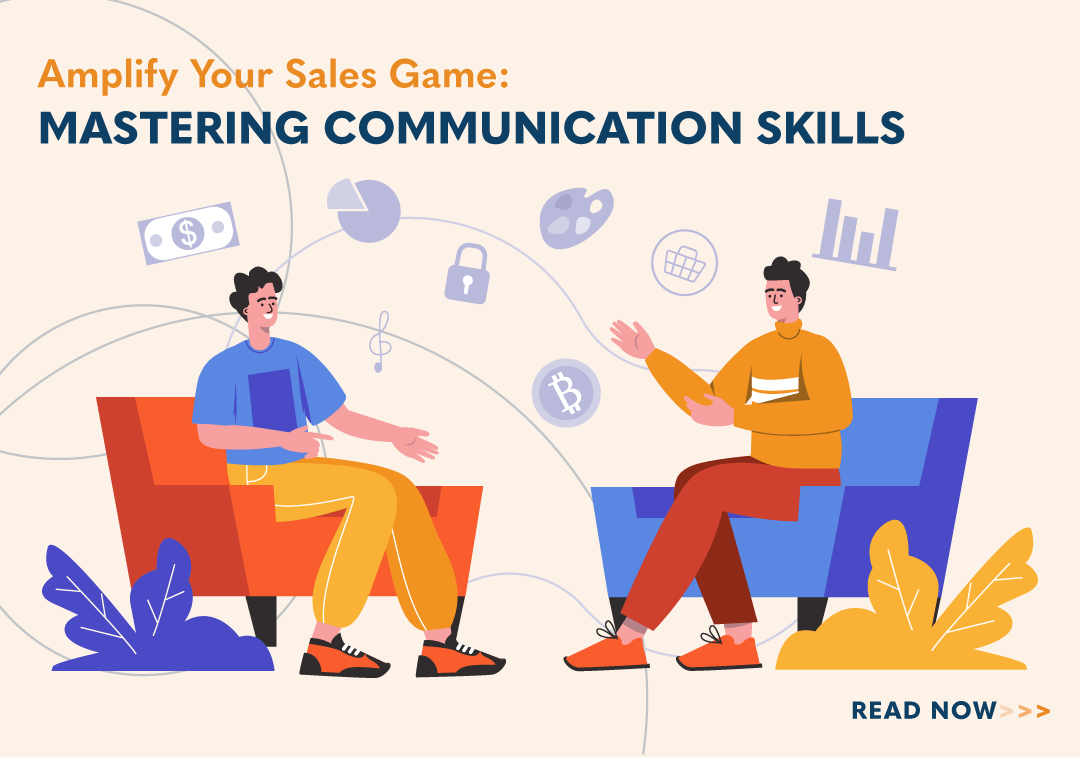Amplify Your Sales Game: Mastering Communication Skills

“Why didn’t you tell me about this sooner?” the prospect says with slight frustration. You’re perplexed knowing you diligently followed up with phone calls, emails, and LinkedIn messages for the past six months to secure this appointment. If you’ve ever experienced this bewildering scenario, you’re not alone. Communication breakdowns can leave sales reps scratching their heads, questioning where things went wrong. This article delves into communication errors, their underlying causes, and, most importantly, how sales reps can overcome them to forge stronger connections with prospects.
Imagine describing what garlic smells like to someone with no sense of smell. It would be a challenging task. It is comparable to the challenges that sales reps face when they’re communicating a new product or solution to prospects who are unfamiliar with it. Each prospect has a unique perspective on the problem and preconceived solutions. The art of selling is uncovering the problems and helping them gain a new perspective on the solution’s value.
Communicating Value
If you are ever fortunate enough to find a hundred-dollar bill on the sidewalk, you will likely not hesitate to pick it up. The value is so apparent that everyone will respond predictably. Similarly, when prospects fail to respond, it often indicates their failure to recognize sufficient value. High-performing sellers are better at helping prospects recognize value than average sellers.
Average sellers typically have a general understanding of the value that their solution brings to their customers. They have a basic grasp of the solution’s benefits, explicitly addressing the apparent problem it solves. However, what average sellers often struggle with is effectively communicating the impact of the problem being solved by their solution.
Effective communication of implications is crucial in helping prospects fully recognize the value of a product or solution. While the surface-level value often includes benefits like improved efficiency, increased profits, and reduced downtime, high-performing sales professionals go beyond these apparent advantages. They delve deeper, think strategically, and explore the potential consequences of not addressing the problem or uncovering additional benefits that may not be immediately obvious.
Acknowledge, Don’t Accept
For many people, acknowledging communication shortcomings takes a lot of work. Often, people tend to shift blame onto others rather than taking responsibility for their own mistakes. This misplaced focus on blame can hinder progress in resolving communication breakdowns. Recognizing our role in these situations is crucial to making meaningful improvements.
Acknowledging a weakness is not the same as accepting it. It is a necessary first step in correcting it. Salespeople rarely take the time to analyze where the communication breakdown is occurring. In a sales environment, if a prospect misunderstands the seller, they rarely ask for clarification. Minor misunderstandings by the prospect can lead to tragic consequences for the salesperson.
Active listening is a well-known strategy in sales, with Stephen Covey emphasizing the importance of seeking understanding before seeking to be understood. However, empathic listening, which involves understanding the prospect’s emotions and underlying motivations, may be less familiar. Empathic listening requires putting oneself in the prospect’s shoes and acknowledging their feeling from their perspective.
For instance, when a prospect objects, rather than immediately countering with a rebuttal, a salesperson can validate their emotions by asking questions. They might say, “It sounds like you feel frustrated about changing solutions. Can you tell me more about what’s causing that feeling?” By acknowledging the emotion and encouraging further discussion, the sales rep demonstrates empathy and creates a safe space for the prospect to express their concerns.
Addressing communication problems necessitates recognizing our own contribution to the breakdown. It involves actively listening and empathizing with prospects to understand their emotions and motivations. When prospects voice an objection, there are two components, the concern and the emotion or attitude behind the objection. Average sales performers address the concerns, while high performers address both.
More Eyes and Ears Create Better Outcomes
In the organizations we collaborate with, we frequently encounter group-talk communication challenges. Similar to groupthink, it occurs when team members reach a consensus and echo the same viewpoints, often driven by fear, a lack of critical thinking, limited diversity, or sheer complacency.
People tend to imitate those around them, sometimes becoming accustomed to a problem that a fresh perspective could immediately recognize. To illustrate this, let’s consider our experience working with a client in the technology industry. The sales reps were highly knowledgeable and technically sophisticated, yet they needed help connecting with prospects. In our discovery meetings, they expressed, “Some people just don’t get it.” However, upon reviewing a few live sales calls, we identified a different issue at play.
Prospects were feeling intimidated, and occasionally, the sales rep’s answers sounded condescending. It became apparent that the sales representatives’ expertise unintentionally overwhelmed the prospects, hindering effective communication and rapport-building, extending the sales cycle, and losing opportunities.
Component of Effective Communication
The quality of information exchanged is often more critical than the sheer quantity of the information being shared. When customers assess the quality of information, they consider various factors, including credibility, predictive relevance, and veracity.
Credibility is vital in effective communication. While most sales reps rely on testimonials, social proof, and facts, it’s important to avoid overwhelming prospects with information overload. A more effective approach is to engage prospects by asking questions that convey the desired information. For instance, you could ask, “Were you aware that Selling Power has recognized Janek Performance Group as the top sales training company for ten consecutive years?” By credibly presenting information, customers are more likely to trust and value it.
Predictive relevance involves anticipating customer concerns and aligning information with their needs, goals, and circumstances. Customers evaluate the quality of communication based on how well it aligns with their concerns. To ensure predictive relevance, focus on two key areas: addressing current problems and highlighting desired outcomes. Customers perceive information as high quality and valuable by tailoring it to their specific situation.
Veracity refers to the truthfulness and accuracy of the information shared. Customers evaluate whether the information is supported by evidence, comes from reliable sources, and is free from biases or distortions. Building trust and confidence in the information is crucial, as customers value accuracy and reliability. Veracity is more than just telling the truth. It’s respecting the prospect’s right to make their own decisions.
In Conclusion
Communication problems are inevitable but should be viewed as opportunities to propel the conversation forward. Problems are like coal thrown into a locomotive engine because burning them by finding and implementing solutions moves both parties forward.
Effective communication is not just about transmitting information but rather about illuminating new horizons and empowering prospects to make choices that align with their goals and aspirations. It is the key that unlocks doors, transforms perceptions, and drives successful sales interactions.
While the quality of information is undoubtedly important, the effectiveness of its exchange truly matters. Effective communication involves sharing information and ensuring that the customer receives, understands, and interprets it correctly. This requires clear and concise communication, emphatic listening, and addressing any potential misunderstandings or gaps in knowledge.
Comments are closed.

- Account Planning (11)
- Awards (50)
- Client Testimonial (37)
- Personal Branding (19)
- Podcast (11)
- Research (68)
- Sales Career Development (85)
- Sales Coaching (153)
- Sales Consulting (133)
- Sales Culture (164)
- Sales Enablement (340)
- Sales Leadership (108)
- Sales Management (242)
- Sales Negotiation (16)
- Sales Prospecting (124)
- Sales Role-Playing (18)
- Sales Training (229)
- Selling Strategies (255)
- Soft Skills (67)
- Talent Management (92)
- Trusted Advisor (27)
- Virtual Selling (41)
- Webinar (10)






























This write up on mastering communication skill has in no small way explained with thought provoking insight on the grey areas of seller/prospect relationship. Sales people are urged to listen intently and understand prospects concerns which translates to their attitudes and emotions .They should also perceive the effect or implication of their concerns on new deals offered by the seller. To be successful with new deals or offering, they must be willing to provide solutions to lingering concerns.